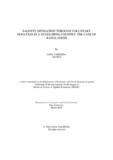Salinity mitigation through voluntary donations in a developing country: the case of Bangladesh

View/Open
Date
2020-03Publisher
Brac UniversityAuthor
Tahzeeda, JasiaMetadata
Show full item recordAbstract
This research paper concentrates on the role of voluntary donations in Bangladesh for salinity mitigation. Therefore, questionnaire survey was conducted on 1000 respondents, where their willingness to donate labor and money to collective water and/or land salinity mitigation were elicited. The relationships between the labor and money donations were analyzed in relation to socioeconomic variables such as income, education, family structure, and occupation using bivariate probit and tobit regressions. The analysis finds that income and occupation are the most important determinants to decide between labor and money donations as well as their respective amount for local Bangladeshi people who are impacted by salinity intrusion resulting from cyclone AILA. Education has found to have a negative impact on the labor donation, whereas it was found the fixed occupation has a positive impact on labor donation. Poor and the less educated people with more natural dependence are found to donate more labor. The rich people with less natural dependence are more willing to donate money, whereas the magnitude of donations is quite significant. Labor and money donations demonstrate the relation of substitutability with respect to most socioeconomic variables. The finding of the research exhibits that labor donation is a vital channel to mitigate land and/or water salinity which should be utilized for ensuring sustainable development in developing countries.
